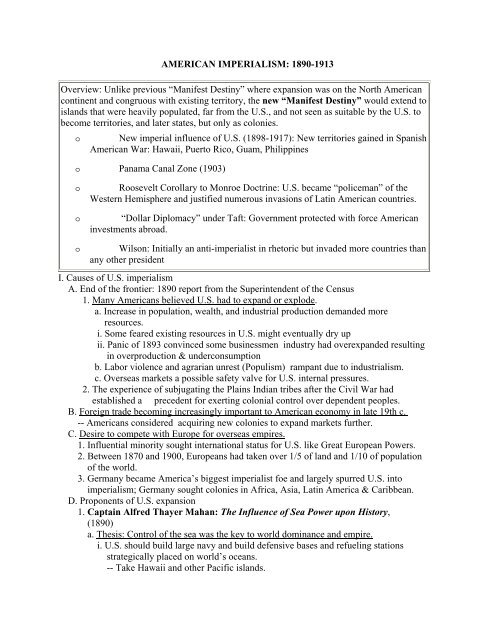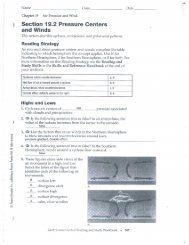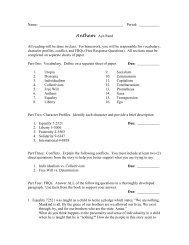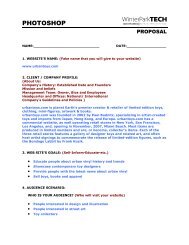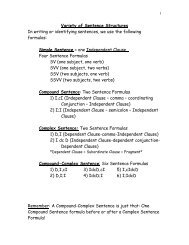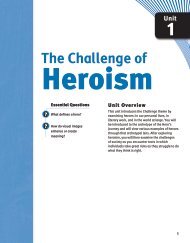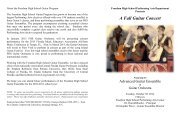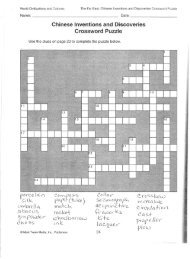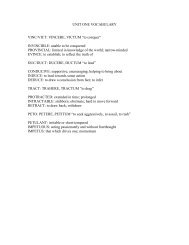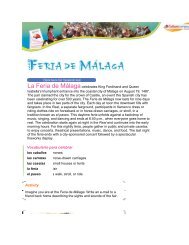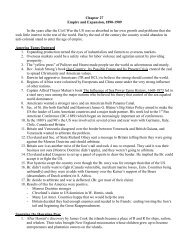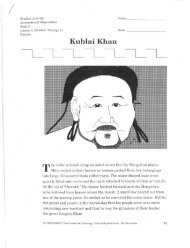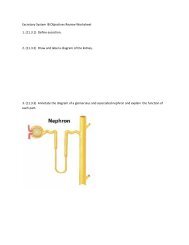Imperialism Notes 1890-1913
Imperialism Notes 1890-1913
Imperialism Notes 1890-1913
You also want an ePaper? Increase the reach of your titles
YUMPU automatically turns print PDFs into web optimized ePapers that Google loves.
AMERICAN IMPERIALISM: <strong>1890</strong>-<strong>1913</strong><br />
Overview: Unlike previous “Manifest Destiny” where expansion was on the North American<br />
continent and congruous with existing territory, the new “Manifest Destiny” would extend to<br />
islands that were heavily populated, far from the U.S., and not seen as suitable by the U.S. to<br />
become territories, and later states, but only as colonies.<br />
o New imperial influence of U.S. (1898-1917): New territories gained in Spanish<br />
American War: Hawaii, Puerto Rico, Guam, Philippines<br />
o Panama Canal Zone (1903)<br />
o Roosevelt Corollary to Monroe Doctrine: U.S. became “policeman” of the<br />
Western Hemisphere and justified numerous invasions of Latin American countries.<br />
o “Dollar Diplomacy” under Taft: Government protected with force American<br />
investments abroad.<br />
o Wilson: Initially an anti-imperialist in rhetoric but invaded more countries than<br />
any other president<br />
I. Causes of U.S. imperialism<br />
A. End of the frontier: <strong>1890</strong> report from the Superintendent of the Census<br />
1. Many Americans believed U.S. had to expand or explode.<br />
a. Increase in population, wealth, and industrial production demanded more<br />
resources.<br />
i. Some feared existing resources in U.S. might eventually dry up<br />
ii. Panic of 1893 convinced some businessmen industry had overexpanded resulting<br />
in overproduction & underconsumption<br />
b. Labor violence and agrarian unrest (Populism) rampant due to industrialism.<br />
c. Overseas markets a possible safety valve for U.S. internal pressures.<br />
2. The experience of subjugating the Plains Indian tribes after the Civil War had<br />
established a precedent for exerting colonial control over dependent peoples.<br />
B. Foreign trade becoming increasingly important to American economy in late 19th c.<br />
-- Americans considered acquiring new colonies to expand markets further.<br />
C. Desire to compete with Europe for overseas empires.<br />
1. Influential minority sought international status for U.S. like Great European Powers.<br />
2. Between 1870 and 1900, Europeans had taken over 1/5 of land and 1/10 of population<br />
of the world.<br />
3. Germany became America’s biggest imperialist foe and largely spurred U.S. into<br />
imperialism; Germany sought colonies in Africa, Asia, Latin America & Caribbean.<br />
D. Proponents of U.S. expansion<br />
1. Captain Alfred Thayer Mahan: The Influence of Sea Power upon History,<br />
(<strong>1890</strong>)<br />
a. Thesis: Control of the sea was the key to world dominance and empire.<br />
i. U.S. should build large navy and build defensive bases and refueling stations<br />
strategically placed on world’s oceans.<br />
-- Take Hawaii and other Pacific islands.
ii. Advocated U.S. build a canal across the isthmus of Central America to link<br />
Atlantic<br />
& Pacific Oceans.<br />
b. Helped stimulate naval race among the great powers.<br />
c. Persuaded “yellow journalists” to push for modern navy of steel ships.<br />
d. By 1898, the U.S. had fifth most powerful navy; third by 1900.<br />
2. Josiah Strong: Our Country(1885)<br />
a. Advocated superiority of Anglo-Saxon civilization<br />
b. Urged Americans spread religion & democratic values to “backward” peoples.<br />
3. Theodore Roosevelt and Henry Cabot Lodge<br />
a. Social Darwinism meant earth belonged to the strong & fit -- U.S.<br />
-- Stronger nations dominating weak ones was part of natural law.<br />
b. If U.S. was to survive in competition of modern states, it too would have<br />
to become an imperial power<br />
4. Senator Albert Beveridge: The American Republic is part of the movement of a superior<br />
race, ordained by God<br />
5. “Yellow journalism” of Joseph Pulitzer and William Randolph Hearst stimulated<br />
Americans’ interest abroad.<br />
E. Pan-Americanism, James G. Blaine<br />
1. Secretary of State under Presidents Garfield and B. Harrison.<br />
2. “Big Sister” policy aimed to gain Latin American support of U.S. leadership<br />
and to open Latin American markets to U.S. products.<br />
-- Essentially guaranteed U.S. hegemony in Latin America in 1880s.<br />
3. First Pan-American Conference in Washington, D.C. held in 1889.<br />
a. U.S. proposals rejected by Latin American countries.<br />
i. Inter-American customs union not appealing because European<br />
goods were cheaper for Latin Americans.<br />
ii. Hemispheric arbitration organization rejected due to fears<br />
of U.S. dominance.<br />
b. Opened door for future hemispheric conferences.<br />
F. Samoan crisis @ Pago Pago<br />
1. U.S. and German navies nearly engaged each other in 1889 over Samoan Islands.<br />
-- Germany did not wish to provoke U.S. and agreed to settlement<br />
2. Issue resolved in 1900 treaty with Germany and Britain<br />
a. U.S. gained 76 square miles -- American Samoa including Pago Pago.<br />
b. Germany received the two largest islands.<br />
c. Britain was compensated with other territories in the Pacific.<br />
II. Venezuela Boundary Dispute, 1895-1896<br />
A. Boundary between British Guiana and Venezuela in dispute for over half a century.<br />
-- Issue became moot when gold was discovered in the border region.<br />
B. President Cleveland warned Britain not to takeVenezuelan territory<br />
1. Violated Monroe Doctrine; U.S. stated it now called shots in Western Hemisphere.<br />
2. London should submit the dispute to arbitration.<br />
C. Britain denied legality of Monroe doctrine and refused arbitration.<br />
D. Cleveland urged appropriation from Congress for commission of experts who would<br />
create an equitable border between Venezuela and Br. Guiana.
-- If Britain refused to accept it, U.S. would go to war.<br />
E. Britain had no real urge to fight (despite naval superiority of 32-5 in battleship class<br />
warships)<br />
1. Biggest reason for British concern: Boer War in South Africa<br />
2. Canada still vulnerable<br />
3. British merchant marine vulnerable to American commerce raiders.<br />
4. British preoccupied with German naval threat and Russian & French unfriendliness.<br />
F. London consented to arbitration.<br />
G. Results<br />
1. Prestige Monroe Doctrine enhanced<br />
2. Latin American republics pleased by U.S. determination to protect them.<br />
3. Britain courted U.S. for friendship in the face of the continental threat.<br />
-- Left U.S. able to pursue aggressive foreign policy w/o British reprisals.<br />
III. Hawaii<br />
A. Since early 19th century, America gradually came to regard Hawaiian Islands as an<br />
extension of the Pacific Coast.<br />
B. <strong>1890</strong>, McKinley Tariff raised barriers against Hawaiian sugar.<br />
-- American sugar planters sought annexation as it would eliminate tariffs.<br />
C. Queen Liliuokalani, a nationalist, insisted Hawaiians should control Hawaii<br />
--White planters, mostly Americans, alarmed at Queen’s policies and American tariff.<br />
D. Tiny minority of white planters led by Sanford B. Dole organized successful revolt in<br />
1893.<br />
1. Openly assisted by American troops who landed under unauthorized orders of U.S.<br />
minister in Honolulu, John C. Stevens.<br />
2. Stevens: “The Hawaiian pear is now fully ripe and this is the golden hour for the<br />
U.S. to pluck it.”<br />
3. Treaty for annexation rushed to Washington<br />
E. Before treaty could be passed through Senate, Cleveland assumed office and refused to sign<br />
any annexation bill and sent special investigator to Hawii.<br />
1. Findings indicated majority of Hawaiians did not favor annexation:<br />
2. Provisional gov’t had been established by force<br />
3. Cleveland ordered troops to be removed<br />
F. Results<br />
1. Cleveland unsuccessful in reinstating the queen.<br />
a. U.S. public opinion would not have tolerated force to unseat white planters.<br />
b. Revolutionaries proclaimed a Hawaiian Republic on July 4, 1894 with Dole<br />
as president.<br />
2. Annexation abandoned until 1898; Dole served as territorial governor from 1900-03<br />
3. First full-fledged imperialistic debate in U.S. history.<br />
a. Cleveland savagely criticized for trying to stem the new Manifest Destiny.<br />
b. Cleveland’s motives honorable in the face of international imperialism..<br />
IV. Cuba<br />
A. Atrocities in Cuba sensationalized (and even made up) by “yellow press”<br />
1. Spanish misrule as well as the devastating Wilson-Gorman Tariff of 1894 damaged<br />
Cuba’s sugar-based economy (many plantations owned by Americans)
-- A new Cuban rebellion in the <strong>1890</strong>s resulted in American property losses as well as<br />
Cuban and Spanish<br />
2. Reconcentration -- Spanish military concentrated masses of Cuban civilians in areas<br />
under their control. -- About 100,000 died between 1896 and 1898.<br />
-- Spain’s leader in Cuba, Valeriano Weyler, portrayed in U.S.as “Butcher Weyler”<br />
3. President Cleveland refused to intervene and issued neutrality proclamation.<br />
-- U.S. mediation was offered in the conflict but Spain refused.<br />
4. Pulitzer and Hearst attempted to out do each other; lesser competitors also involved<br />
a. Hearst sent artist Frederic Remington to Cuba to draw sketches.<br />
b. When Remington reported conditions not bad enough to warrant hostilities,<br />
Randolph allegedly replied, “You furnish the pictures & I’ll furnish the war.”<br />
c. Remington depicted Spanish customs officials as brutally disrobing and searching an<br />
American woman.(In reality, female attendants did the duty)<br />
5. McKinley’s ascension to presidency began stronger rhetoric toward Spain.<br />
a. In autumn of 1897, McKinley came close to delivering an ultimatum to Spain that<br />
would have resulted in war.<br />
b. Spain ended reconcentration in 1897, removed Weyler, & gave some autonomy to<br />
Cubans<br />
c. It appeared war might be avoided.<br />
B. Cuban Revolt<br />
1. Spanish in Cuba rioted to protest Spain’s talk of granting Cuba type of self-gov’t.<br />
2. U.S. sent Battleship Maine to Cuba in 1898<br />
a. Aimed to protect and evacuate Americans if danger occurred while also<br />
giving voice to popular distaste for Spain’s reconcentration policies.<br />
b. Sent ostensibly as a “friendly visit”<br />
3. de Lome letter<br />
a. Feb. 9, 1898, Hearst sensationally headlined a stolen private letter written by Spanish<br />
minister in Washington, Dupuy de Lome that portrayed McKinley as corrupt and<br />
indicated Spain lacked good faith in instituting reforms in Cuba.<br />
b. U.S. uproar forced Dupuy de Lome to resign before U.S. called for his recall.<br />
C. Explosion of Maine, Feb. 15, 1898 – immediate cause of Spanish American War<br />
a. 266 officers and men dead.<br />
b. Spanish investigation announced explosion as internal, presumably accidental.<br />
c. American version reported blast caused by a submarine mine.<br />
-- 1976 U.S. Navy report showed blast inside the ship was accidental.<br />
d. Americans accepted the submarine mine view and leapt to conclusion that<br />
Spanish gov’t was responsible. Yellow press helped to fuel the public fire.<br />
e. Americans now cried for war: “Remember the Maine! To hell with Spain!”<br />
V. Spanish-American War -- 1898<br />
A. Spain agreed to US demands: revocation of reconcentration & armistice with Cuban rebels.<br />
B. McKinley and Wall Street not eager for war but yellow press forced the issue<br />
1. McKinley did not want war but was savagely criticized by jingoes e.g. TR.<br />
-- McKinley did not believe Cuban independence was in U.S. long-term interests.<br />
2. Mark Hanna and Wall Street did not want war: might interfere with trade in Cuba.<br />
3. Public, prodded by yellow press, demanded war to free the abused Cubans.<br />
4. Demands of preserving Republican party biggest factor in decision for war.
C. McKinley sent war message to Congress on April 11, 1898.<br />
1. Urged armed intervention to free oppressed Cubans; Congress agreed<br />
2. Teller Amendment -- Proclaimed to the world that when the U.S. had overthrown<br />
Spanish misrule, it would give the Cubans their freedom.<br />
-- Europeans skeptical<br />
D. U.S. army small and weak compared to Spain; U.S. Navy slightly less powerful than<br />
Spain’s<br />
E. Admiral Dewey victorious at Manila Bay<br />
1. While Secretary of War was away, Undersecretary of War Roosevelt cabled<br />
Commodore George Dewey to attack Spain’s Philippines in the event of war.<br />
-- McKinley subsequently confirmed these instructions<br />
2. May, 1898, Dewey’s 6 warships sailed into Manila Harbor and destroyed all 10 of<br />
Spain’s ten warships; 400 Spaniards killed & wounded; 1 American death (heat stroke)<br />
3. Germans arrived with 5 warships; more powerful than Dewey.<br />
a. Dewey threatened German commander with war “as soon as you like”<br />
b. False story emerged that British prevented Germans from destroying U.S. fleet.<br />
4. Three months later, American troops finally arrived and captured Manila in August.<br />
-- Aided by Filipino insurgents commanded by their well-educated, part-Chinese leader,<br />
Emilio Aguinaldo (brought in from exile).<br />
5. After U.S. annexation of Philippines, Aguinaldo led an insurrection against the U.S.<br />
F. Annexation of Hawaii (July 1898)<br />
1. U.S. used the pretense of needing Hawaii as a coaling and provisioning way<br />
station, in order to send supplies and reinforcements to Dewey in Manila Harbor.<br />
2. White-dominated gov’t in Hawaii eager to be annexed (like Texas earlier)<br />
3. Joint resolution of annexation rushed through Congress and approved by McKinley<br />
-- Hawaiians granted U.S. citizenship and received full territorial status in 1900.<br />
G. U.S. invasion of Cuba and Puerto Rico<br />
1. Spanish fleet eventually landed at bottle-shaped Santiago Harbor where they were<br />
promptly blockaded by the more powerful American fleet.<br />
2. Invading American army took high ground near Santiago without serious opposition.<br />
a. Theodore Roosevelt’s Rough Riders part of the invading army.<br />
b. Heavy fighting on at El Caney and San Juan Hill where “Rough Riders” charged up<br />
after<br />
the hill had been largely won.<br />
i. Two black regiments provided heavy support (about 1/4 of invasion force)<br />
ii. In actuality, the “Rough Riders” first took Kettle Hill; heavy casualties.<br />
3. July 1, Spanish fleet completely destroyed<br />
a. U.S.S. Oregon used more firepower than Spain’s 4 armored cruisers combined.<br />
-- About 500 Spaniards killed; only one American .<br />
b. Santiago surrendered by Spain shortly thereafter.<br />
4. U.S. casualties: about 379 dead in battle; over 5,000 dead due to disease<br />
H. U.S. Army invaded Puerto Rico<br />
1. U.S. sought to take the island before the war with Spain ended.<br />
2. Most of population regarded U.S. soldiers as liberating heroes.<br />
3. Spain signed Armistice on August 12, 1898.<br />
I. Treaty of Paris, 1898
1. Cuba freed from Spain<br />
2. U.S. received Pacific island of Guam which they had captured early in the war.<br />
3. U.S. gained Puerto Rico, the last vestige of Spain’s American empire.<br />
4. Philippine issue a major dilemma in the negotiations.<br />
a. U.S. took Manila the day after Spain sued for peace<br />
i. Philippines thus not one of the spoils of war.<br />
ii. U.S. agreed to pay Spain $20 million.<br />
b. McKinley’s dilemma<br />
i. Valuable Philippines larger than British Isles; population of 7 million.<br />
ii. Did not feel U.S. should give islands back to Spain esp. after fighting<br />
a war to free Cuba.<br />
iii. If left alone, Philippines might fall into anarchy<br />
-- Perhaps Germany would then seize it creating a world war.<br />
iv. Least of evils was to take Philippines and leave independence for later.<br />
VI. <strong>Imperialism</strong> debate touched off by spoils of Spanish American War<br />
A. Philippines issue created a huge imperialism debate<br />
1. Expansionist pressure from various groups also forced McKinley’s hand<br />
a. Philippines (& Hawaii) seen as necessary stepping-stones to Asia (esp. China).<br />
b. Protestant missionaries eager to convert Catholic Filipinos.<br />
c. Businessmen clamored for new Philippine market inc. Hanna.<br />
d. Raw materials desireable<br />
2. McKinley later reported as saying an inner voice told him to take all the Philippines and<br />
Christianize and civilize them after he had knelt seeking divine guidance.<br />
B. Democrats tended to be anti-imperialist especially William Jennings Bryan.<br />
1. Feared foreign issues would overshadow much needed reform at home.<br />
2. Some feared foreign workers would lower wages at home.<br />
3. Others feared American factories would be relocated overseas.<br />
4. Colonies would require standing army; farmers’ son’s would be in harm’s way.<br />
-- Increased army would result in higher taxes.<br />
5. Others feared mongrelization of America.<br />
6. Exploited racial minorities in America opposed to doing the same overseas.<br />
C. Anti-Imperialist League<br />
1. Formed to oppose McKinley’s expansionism.<br />
2. Group inc. presidents of Stanford & Harvard Universities, philosopher William James,<br />
and Mark Twain; Samuel Gompers and Andrew Carnegie.<br />
3. Filipinos wanted freedom and annexation violated “consent of the governed”<br />
philosophy in the Declaration of Independence.<br />
-- Despotism abroad might lead to despotism at home.<br />
4. Annexation would entangle the U.S. politically and military in Asia.<br />
D. Expansionists and imperialists<br />
1. Appealed to patriotism and to the glory of annexation.<br />
2. Played up possible trade profits; Manila might become another Hong Kong.<br />
3. Philippines had abundance of natural resources.<br />
4. U.S. should help uplift (and exploit) the world’s poor.<br />
E. Senate passed treaty on Feb. 6, 1899 with the unexpected support of Bryan.
1. He claimed the sooner U.S. passed treaty, the sooner Filipinos would get their<br />
independence.<br />
2. Responsibility for the Philippines thus rested with the Republicans.<br />
F. Insular cases<br />
1. Cases appeared before the Supreme Court concerning extent to which constitutional<br />
rights applied to peoples of newly acquired territories.<br />
2. 1901 Supreme Court rulings<br />
a. Some rights are fundamental and applied to all American territory.<br />
b. Other rights are procedural and should not be imposed upon those<br />
unfamiliar with American law.<br />
c. Congress must determine which procedural rights applied in unincorporated<br />
territories.<br />
d. The Constitution did not follow the flag.<br />
G. The question of Cuban independence<br />
1. U.S. military gov’t set up under General Leonard Wood (Rough Riders)<br />
a. Major advances achieved in gov’t, finance, education, agriculture, and<br />
public health.<br />
b. Gains made on yellow fever epidemic by Dr. Walter Reed.<br />
2. U.S. withdrew from Cuba in 1902 in honor of the Teller Amendment.<br />
3. Platt Amendment<br />
a. Mechanism to ensure that Cuba would not be vulnerable to foreign<br />
powers and to maintain U.S. influence in Cuban affairs.<br />
b. Cubans forced to write Platt Amendment into their own Constitution of 1901<br />
c. Provisions:<br />
i. Cuba bound itself not to impair their independence by treaty or by<br />
contracting a debt beyond their resources.<br />
-- U.S. gov’t had right to approve all Cuban treaties.<br />
ii. U.S. might intervene with troops to restore order and to provide mutual<br />
protection.<br />
iii. Cubans promised to sell or lease needed coaling or naval stations.<br />
-- Guantanamo Bay Naval Base still controlled by U.S. today.<br />
VII. Post-war nationalism after the Spanish American War (“splendid little war”--John Hay)<br />
A. Established America’s first overseas empire, albeit modest compared to contemporary<br />
European standards.<br />
B. European powers accorded U.S. more respect; Monroe Doctrine given a significant boost.<br />
-- Latin America deeply suspicious of U.S. motives<br />
C. Britain became an ally while Germany grew more frustrated.<br />
D. Philippines drew U.S. into Asian affairs; later proved a liability to defend (WWII vs. Japan)<br />
E. Mahan’s view of necessity for larger navy prevailed; U.S. undertook a large naval buildup.<br />
F. Elihu Root improved War Department; later important when U.S. involved in World War I.<br />
G. War served to further heal the rift between North and South; soldiers fought side by side.<br />
H. Nationalism the result of an urban, mass-culture, industrial society.<br />
VIII. Insurrection in the Philippines<br />
A. Filipinos assumed they would be granted freedom after the war, like the Cubans.<br />
1. Senate narrowly refused to pass such a resolution; Philippines became a protectorate
2. Filipinos were thus tragically deceived.<br />
B. Open rebellion began Feb. 1899; Emilio Aguinaldo declared Philippines independent.<br />
1. More savage fighting and resulted in more casualties than Spanish American War.<br />
2. Filipino armies fled to the jungle where they waged vicious guerrilla warfare.<br />
-- Infuriated American troops responded with atrocities<br />
3. 4,300 Americans and 57,00 Filipinos dead<br />
C. Anti-Imperialists redoubled their protests.<br />
1. U.S. fighting to free Cuba, was now waging a war 10,000 miles away and depriving<br />
the population of their liberty.<br />
2. Atrocity stories boosted their protests (like “Butcher” Weyler in Cuba)<br />
D. Insurrection finally broken in 1901 when Aguinaldo was captured.<br />
E. McKinley appointed Philippine Commission to make appropriate recommendations in<br />
1901.<br />
1. Led by William H. Taft who called Filipinos his “little brown brothers”<br />
2. U.S instituted education, sanitation, public health, and infrustructure reforms though<br />
Filipinos remained resentful..<br />
3. Philippines finally got their independence on July 4, 1946.<br />
IX. Open Door Policy in China<br />
A. Foreign powers in China lured by huge Chinese market and missionary zeal.<br />
1. By late 19th c., Japan and western European powers had carved much of China<br />
into separate spheres of influence.<br />
-- Within each sphere, on nation held economic dominance.<br />
2. Americans manufacturers feared Chinese markets would be monopolized by Europeans<br />
while American missionaries had a number of groups in China.<br />
B. Open Door Note (summer of 1899)<br />
1. Issued by Secretary of State John Hay (ex-Lincoln secretary)<br />
-- U.S. at a disadvantage geographically compared to Russian and Japan and Americans<br />
feared they might get frozen out if they didn’t act quickly.<br />
2. Urged all the Great Powers to announce that in their leaseholds or spheres of influence<br />
they would respect certain Chinese rights and ideal of fair competition.<br />
-- In effect, when any Great Power dealt with a foreign trader, it would observe<br />
Open Door.<br />
3. Open Door gained wide acceptance in the U.S.<br />
4. Policy did not gain international acceptance as it was weak and relatively short-lived.<br />
C. Boxer Rebellion (1900)<br />
1. Millions of Chinese enraged over Open Door Policy<br />
2. Superpatriotic group of Chinese “Boxers” killed over 200 missionaries & other whites.<br />
-- A number of foreign diplomats besieged in Beijing.<br />
3. Multinational force of about 18,000 arrived to put down the rebellion.<br />
-- Included Japan, Russia, Britain, France, Germany and U.S. troops (2.5K)<br />
4. Victorious allies assessed an indemnity of $333 million (U.S. share $24.5 mil)<br />
a. When Washington found their sum excessive, remitted $18 million.<br />
b. Appreciative of U.S., Chinese gov’t set aside money to educate a select group of<br />
Chinese students in the U.S. as a gesture of goodwill.<br />
-- Students played significant role in westernizing the Orient.<br />
D. Hay announced in 1900 that henceforth the Open Door would embrace territorial
integrity of China in addition to its commercial treaty.<br />
1. Sought to eliminate carving up of China with Boxer outrages as a pretext.<br />
2. Hay did not ask for formal acceptances.<br />
3. China thus spared partition during these years.<br />
-- Probably due more to distrust among great powers than Hay’s policy.<br />
X. Election of 1900 and Theodore Roosevelt’s ascendancy to the White House<br />
A. Election of 1900<br />
1. Republicans nominated McKinley<br />
a. Had won the war, acquired territory, est. gold standard, and brought<br />
economic prosperity.<br />
b. Platform endorsed prosperity, gold standard, and overseas expansion.<br />
-- Yet, between 60-88% of Americans were poor or very poor.<br />
c. Theodore Roosevelt nominated as vice president.<br />
2. Democrats nominated William Jennings Bryan<br />
-- Ill-conceived platform once again pushed for free silver<br />
3. Campaign similar to 1896<br />
a. McKinley waged a “front porch” campaign<br />
b. Bryan campaigned throughout the nation criticizing Republican imperialism<br />
and support of trusts; imperialism issue now passe.<br />
c. Teddy Roosevelt out-campaigned Bryan and cut into his Midwest following.<br />
-- Claimed that Bryan would rock the boat of prosperity.<br />
4. McKinley d. Bryan 292-155 and by nearly 900,000 popular votes.<br />
B. McKinley assassinated in Sept. 1901 by deranged anarchist (Polish immigrant), Leon<br />
Czolgosz<br />
1. TR became the youngest president thus far in U.S. history at age 42.<br />
2. Roosevelt pledged he would carry out policies of his predecessor.<br />
C. Theodore Roosevelt<br />
1. 1st President to play a significant role in world affairs<br />
2. <strong>Imperialism</strong> in the Western Hemisphere: “Speak softly but carry a big stick [and] you<br />
will go far”<br />
3. Major proponent of military and naval preparedness.<br />
XI. Panama Canal<br />
A. Spanish-American War emphasized need for a canal to connect Atlantic & Pacific Oceans.<br />
-- U.S. now had to protect Puerto Rico, Hawaii, the Philippines, & the U.S. merchant<br />
marine.<br />
B. Overcoming legal challenges<br />
1. Clayton-Bulwer Treaty of 1850 prohibited any country from securing exclusive<br />
control over an isthmian canal.<br />
2. Between 1878 & 1889 the builder of Suez Canal, Ferdinand de Lesseps, could not make<br />
a canal in Panama work. U.S. now eager to take over project.<br />
3. Hay-Pauncefote Treaty (1901)<br />
a. Britain agreed to give U.S. right to build canal and right to fortify it as well.<br />
b. Britain occupied with unfriendly Europe and South African Boer War.<br />
4. Colombian Senate rejected a treaty negotiated with the U.S. for a canal in Panama (which<br />
was part of Colombia); declared U.S. inadequate for such a valuable region.
C. Creation of Panama -- “gunboat diplomacy” on part of U.S.<br />
1. French representative, Phillipe Bunau-Varilla, worked with Panama revolutionists to<br />
raise<br />
tiny “patriot” army and win independence from Colombia.<br />
2. Nov. 3, 1903, Panama revolution<br />
a. U.S. naval forces did not allow Colombian troops across the isthmus.<br />
b. Nov. 6, TR extended recognition of Panama.<br />
3. Hay--Bunau-Varilla Treaty (November, 1903)<br />
a. Bunau-Varilla, now Panamanian minister despite his French citizenship, signed<br />
treaty in Washington with Sec. of State John Hay.<br />
b. Provisions:<br />
i. U.S. would pay Bunau-Varillas’s New Panama Canal Co. $40 million.<br />
ii. Zone of canal widened from 6 miles to 10 miles.<br />
D. Roosevelt’s role in Panama issue became controversial<br />
1. Although American public initially saw Roosevelt’s role in Panama as politically<br />
legitimate,<br />
TR in 1911 claimed “I took the canal,” thus sparking a wave of controversy.<br />
2. U.S. suffered diplomatically as Europeans sneered at apparent U.S hypocrichy.<br />
3. Latin American countries grew weary of the “Colossus of the North”<br />
in the face of Puerto Rico, Cuba, and now Panama.<br />
E. Canal completed in 1914 at initial cost of $400 million<br />
1. Organization perfected under Colonel George Washington Goethals.<br />
2. Colonel William C. Gorgas, made canal zone safe by using sanitation methods<br />
he also used in Havana.<br />
XII. Roosevelt Corollary to the Monroe Doctrine<br />
A. Motivation: TR concerned German & British bill collection violated Monroe Doctrine.<br />
1. Specifically, both Venezuela and Dominican Republic owed much money<br />
2. Venezuela Crisis, 1902 -- Germany sank two Venezuelan gunboats trying to seek<br />
forced payment for heavy Venezuelan debt to Germany.<br />
-- Britain also owed by Venezuela<br />
3. TR devised policy of “preventive intervention” (Roosevelt Corollary)<br />
B. Policy: In future financial crises concerning Latin American debt, U.S. would intervene,<br />
take over customshouses, pay off the debts, and keep European powers out of the<br />
Western Hemisphere.<br />
1. U.S. had moral obligation because it would not allow European nations themselves<br />
to intervene in bankrupt “banana republics.”<br />
2. Thus, U.S. became "Policeman of the Caribbean."<br />
-- Contrasted with Monroe Doctrine that had merely told Europeans to stay out.<br />
3. TR’s policy radical departure but its association with Monroe Doctrine helped it to gain<br />
public acceptance.<br />
4. More than any other factor, policy promoted the “Bad Neighbor” policy toward<br />
Latin America during these years.<br />
5. Policy eventually used to justify wholesale interventions and repeated landings of<br />
U.S. marines<br />
C. In 1905, a Dominican treaty gave U.S. supervisory powers over Dominican tariff<br />
collections.
-- In effect, Dominican Republic became a protectorate of the U.S.<br />
D. Cuba<br />
1. U.S. kept high tariffs against Cuban sugar at behest of U.S. sugar growers.<br />
2. Resulting recession in Cuba combined with discontent over Platt Amendment led to a<br />
Cuban revolution in 1906.<br />
3. TR sent in Marines in 1906 who remained until 1909.<br />
4. U.S. troops would reoccupy Cuba in 1917 during WWI and remain until 1922.<br />
XIII. Russo-Japanese War (1904) and Japanese-American relations<br />
A. Russia and Japan went to war over issue of ports in Manchuria & Korea.<br />
1. Japan destroyed much of Russian fleet<br />
-- First defeat of a non-European power since the Turkish invasion of 1500s.<br />
2. As war dragged on, Japanese ran short of men and money.<br />
3. TR eager to prevent either side from gaining a monopoly in Asia but did not seek war.<br />
a. Concerned about safety of newly acquired Philippines.<br />
b. Japan secretly asked Roosevelt to help sponsor peace negotiations.<br />
B. Treaty of Portsmouth (1905)<br />
1. Both sides met at Portsmouth, NH, in 1905.<br />
a. Japanese demanded huge indemnity and all of strategic Sakhalin island.<br />
b. Russians refused to concede defeat.<br />
2. Agreement: Japanese gained southern half of Sakhalin but no indemnity.<br />
-- Secretly, TR agreed to accept future Japanese dominance of Korea.<br />
3. For his mediation, TR received the Nobel Peace Prize in 1906.<br />
-- Also for his helping arrange int’l conference at Algeciras, Spain in 1906 to<br />
mediate North African disputes.<br />
4. Negative results:<br />
a. U.S. -- Russian relations soured that TR robbed them of military victory.<br />
-- Savage massacres of Russian Jews drew U.S. protest<br />
b. Japan felt robbed of its indemnity and blamed U.S.<br />
-- Naval arms race bet. U.S. & Japan in Asia resulted as mutual distrust grew<br />
C. San Francisco Schoolboard Incident<br />
1. 1906, 70,000 Japanese immigrants poured into California as a result of dislocations and<br />
tax burdens caused by the Russo-Japanese War.<br />
-- Californians feared being confronted with another “yellow peril” and feared<br />
mongrelization of the races; formed influential Asian Exclusion League.<br />
2. Local San Francisco school officials ruled Asian children should attend a special school.<br />
-- School system hard pressed in face of devastating 1906 earthquake.<br />
3. People of Japan furious over discrimination, highly sensitive to race issues.<br />
a. Irresponsible talk of war sizzled in the “yellow press”<br />
b. TR concerned of California starting a war other states would have to fight.<br />
4. TR invited entire San Francisco Board of Education to the White House.<br />
a. Coerced Californians to repeal the order and accept what came to be known<br />
as the “Gentleman’s Agreement”<br />
b. Provisions:<br />
i. Japanese agreed to stop flow of laborers to U.S.<br />
ii. Californians agreed not to ban Japanese from public schools.
D. U.S. -- Japanese Relations to 1920<br />
1. Fearing Japanese perception of U.S. weakness, TR sent the “Great White Fleet”<br />
on a highly visible tour around the world in 1907 starting in VA.<br />
2. Root-Takahira Agreement (1908)<br />
a. U.S. and Japan pledged to respect each other’s territorial possessions in the<br />
Pacific and to uphold the Open Door in China.<br />
b. TR regarded the voyage of his fleet as his most important contribution to peace.<br />
3. Lansing-Ishii Agreement (1917)<br />
a. U.S. acknowledged Japan’s “special interests” in China through reiteration of<br />
its Open Door policy.<br />
b. Aimed partially to reduce German influence in & around China in WWI.<br />
XIV. "Dollar Diplomacy" under President Taft (1909-<strong>1913</strong>)<br />
A. Two aspects:<br />
1. Using foreign policy to protect Wall Street dollars invested abroad (esp. Far East)<br />
2. Using Wall Street dollars to uphold foreign policy.<br />
a. Sought to reduce rival powers e.g. Germany, from taking advantage of<br />
financial chaos in the Caribbean.<br />
b. Thus, U.S. bankers would strengthen U.S. defenses and foreign policies<br />
while bringing prosperity to the U.S.<br />
3. Thus, “Dollar Diplomacy” supplanted the “Big Stick”<br />
B. China -- Manchurian Railroad Scheme<br />
1. Taft saw the Manchurian railway monopoly by Russia and Japan as a threat to<br />
the Open Door.<br />
2. 1909, Taft proposed that a group of U.S. and foreign bankers buy the railroads and<br />
turn them over to China under a self-liquidating arrangement.<br />
a. Plan ill-conceived as Japan and Russia refused to give up important railroads.<br />
b. Taft showered in ridicule.<br />
C. Caribbean<br />
1. Washington urged Wall Street bankers to pump money into Honduras and Haiti<br />
to keep out foreign funds.<br />
2. Ultimately, U.S. sent forces to Cuba, Honduras, the Dominican Republic, and Nicaragua<br />
to restore order.<br />
XV. <strong>Imperialism</strong> under Wilson -- aimed to reinforce Western Hemisphere in the face of WWI.<br />
A. Although Wilson hated imperialism he eventually invaded more countries in Latin America<br />
than any other president in U.S. history (to protect U.S. lives and property in those<br />
countries)<br />
1. Kept marines in Nicaragua making that country, in effect, a U.S. protectorate.<br />
2. U.S. forces sent to Haiti in 1914-15 when Haitian president torn to pieces.<br />
3. 1916, U.S. marines sent to Dominican Republic when riots & civil war broke out.<br />
a. Debt-cursed country became a protectorate of U.S.<br />
4. 1917, U.S. purchased Virgin Islands from Denmark<br />
-- Caribbean sea increasingly now dominated by U.S. (along with Panama route)<br />
B. U.S. invaded Mexico in attempt to capture Pancho Villa.
Bibliography:<br />
Bailey, Thomas A., Kennedy, David M.: The American Pageant, 10th edition, Lexington,<br />
Massachusetts: D.C. Heath, 1994<br />
Brinkley, Alan, American History: A Survey, Compton’s Encyclopedia of American History,<br />
McGraw-Hill, 1995<br />
College Board, Advanced Placement Course Description: History -- United States, European<br />
History, College Entrance Examination Board, 1996<br />
Foner, Eric & Garraty, John A. editors: The Reader’s Companion to American History, Boston:<br />
Houghton MifflinCompany, 1991<br />
Hofstadter, Richard, The American Political Tradition, New York: Alfred Knopf, 1948<br />
Loewen, James W., Lies My Teacher Told Me: Everything Your American History Textbook<br />
Got Wrong, New York: The New Press, 1995<br />
Miller, Nathan, Theodore Roosevelt: A Life, New York: William Morrow and Company, Inc.,<br />
1992<br />
Nash, Gary : American Odyssey, Lake Forest, Illinois: Glencoe, 1992<br />
Painter, Nell Irvin, Standing at Armageddon: The United States, 1877-1919,<br />
New York: W. W. Norton 1987<br />
Schultz, Constance G., The American History Videodisc Master Guide, Annapolis, Maryland:<br />
Instruction Resources Corporation, 1995<br />
Zinn, Howard, A People’s History of the United States, New York: Harper and Row, 1980


